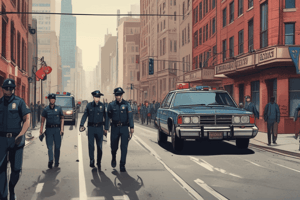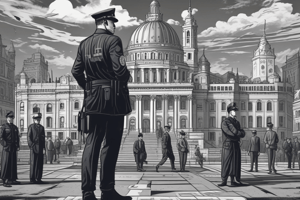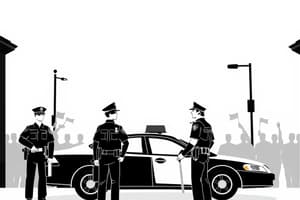Podcast
Questions and Answers
What type of damages can insurance companies not pay?
What type of damages can insurance companies not pay?
- Compensatory damages
- Intentional damages
- Punitive damages (correct)
- Negligent damages
What is a key difference between intentional torts and negligent torts?
What is a key difference between intentional torts and negligent torts?
- Intentional torts are more severe than negligent torts
- Negligent torts are punishable by law, while intentional torts are not
- Intentional torts require malicious intent, while negligent torts do not (correct)
- Intentional torts are criminal, while negligent torts are civil
What is a defense against intentional torts and negligent torts?
What is a defense against intentional torts and negligent torts?
- Lack of malicious intent
- Abnormal training
- Justification under the Criminal Code (correct)
- Good faith ignorance of the law
What is a high-risk liability situation for police officers?
What is a high-risk liability situation for police officers?
Why may a person still be liable in civil court, even if their conduct is justified under the Criminal Code?
Why may a person still be liable in civil court, even if their conduct is justified under the Criminal Code?
Flashcards are hidden until you start studying
Study Notes
Police Liability
- Compensatory and punitive damages are two types of damages that can be awarded in civil lawsuits against police officers.
Types of Damages
- Compensatory damages are intended to compensate the plaintiff for their losses.
- Punitive damages are intended to punish the defendant for their actions.
- Insurance companies cannot pay punitive damages.
Tort Law
- Intentional torts and negligent torts are two types of torts that can be committed by police officers.
- Intentional torts involve intentional misconduct, while negligent torts involve a failure to exercise reasonable care.
Defenses Against Tort Law
- Defenses against intentional torts and negligent torts include arguing that the officer's conduct was justified under the Criminal Code.
Criminal Code and Civil Liability
- Justifications provided by the Criminal Code apply only to criminal liability, not to civil liability.
- If a person's conduct is justified under the Criminal Code, they will have a defense to a criminal charge, but this does not necessarily mean they will be immune from civil liability.
High-Risk Liability Situations for Police Officers
- Six high-risk situations for police officers include:
- Excessive use of force
- False arrest
- False imprisonment
- Negligent use of a firearm
- Negligent use of a motor vehicle
- Roadblocks
Defending Against Civil Suits
- Ways to defend against civil suits include:
- Arguing that the officer's conduct was justified under the Criminal Code
- Identifying ways the officer could have best defended themselves against a civil suit or criminal action.
Studying That Suits You
Use AI to generate personalized quizzes and flashcards to suit your learning preferences.




